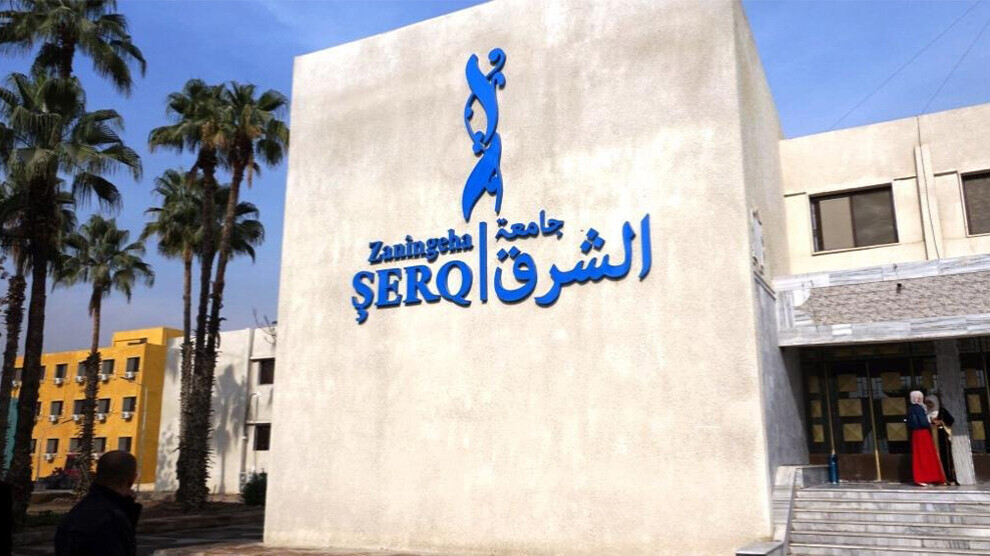Autonomous Administration opens university in Raqqa
The Autonomous Administration of North and East Syria continues its activities for the expansion of the academic sector. A new university has been opened in Raqqa: the Zanîngeha Şerq.
The Autonomous Administration of North and East Syria continues its activities for the expansion of the academic sector. A new university has been opened in Raqqa: the Zanîngeha Şerq.

Despite the long state of war, embargoes and the continued threat from Turkey, research and teaching in the autonomous regions of Northern and Eastern Syria are not being suspended. The activities of the Autonomous Administration in the academic field are aimed at promoting the expansion of the democratic educational model, in which diversity, inclusiveness, participation, multilingualism, equality and equal rights are fundamentally anchored - despite all the restrictions.
The educational model of the universities of the Autonomous Administration is based on free and democratic thinking. Instead of a paternalistic educational system, an equal relationship between students and teachers is sought, on the basis of a scientific model based on commentary, instead of the system of memorization. The Autonomous Administration of North and East Syria has already founded three universities since the Rojava Revolution: The first university was opened in Afrin in 2015, followed by Rojava University in Qamishlo in 2016. The University of Kobanê was established in 2017. After Turkey occupied Afrin three years ago in the spring, most students moved to either Qamishlo or Kobanê.
The Zanîngeha Şerq in Raqqa is the fourth university opened by the Autonomous Administration in the Democratic Federation of North and East Syria. The university was officially inaugurated last weekend, and students have been able to apply to it since July. The Şerq University (arabic Al-Sharq) has two faculties and institutes: the Philosophy Faculty, responsible for research and teaching in the humanities and which houses the Institute for Arabic Language; and the Faculty of Social Sciences with the departments of Mathematics, Physics, Chemistry and Biology and the Institute for Education. The university is located in the al-Mashlab district in the east of the city. This is the neighbourhood that was first liberated by the Syrian Democratic Forces (SDF) from the terror regime of the terror group, the Islamic State.
According to Issa al-Abdullah, co-chair of the Serq University, the application period was very participated. A total of around 600 women and men applied for a place at the university, and around 210 were accepted. “Our admission criteria are seventy percent school grades and thirty percent personal interviews,” said al-Abdullah. Should applicants not be able to meet the admission requirements of the Zanîngeha Şerq, this does not mean that studying at the university is impossible. In this case there is the possibility to take part in admission tests. The lecture period started in October.”
A historic day
The co-chair said at the opening ceremony: "Under the given conditions - the ongoing threats from the Turkish state and the Covid-19 pandemic are just two of the problems we have - it was certainly difficult to expand our university landscape. But despite all the difficulties, it was possible to open the university to give young people a high-quality education. This is a historic day."
The liberation of Raqqa
After the Iraqi city of Mosul was occupied by ISIS in 2014, the jihadists marched into Raqqa, one of the largest cities in Syria, with the weapons they captured in Mosul. The Jabhat al-Nusra (Front al-Nusra) and the so-called Free Syrian Army (FSA) gave up the city. A little later, Raqqa was named the capital of "ISIS caliphate" and fell into a reign of terror based on the Salafist interpretation of Sharia law.
From Raqqa, ISIS gradually took over other northern Syrian cities and turned its attention to Kobanê in September 2014. ISIS attacked Kobanê on three fronts, but encountered incomparable resistance there. The terrorists suffered their first defeat in Kobanê and from then on was gradually pushed back into Raqqa.
On 6 June 2017, the Syrian Democratic Forces began an offensive to liberate Raqqa and, after five months of fierce fighting, were able to end ISIS rule there on 17 October.
The declaration on the liberation of the city was made by the YPJ - Women's Defense Units fighting on the front lines against ISIS. This declaration was announced to the whole world in Al Naim Square, where ISIS previously carried out public executions.
The administration of the liberated city of Raqqa was soon handed over to a Civil Council that had been established in Ain Issa in April.